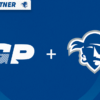The following interview is with Bryan Brighton, a former student-athlete at Michigan State University and currently Director, International with Merrill Corporation. Both MSU and Merrill Corporation are clients of GTG and represent the perfect relationship between an institution, a student-athlete, and the life of that student-athlete after his athletic career is over.
Being a student-athlete is more than what happens on the field. It’s a lifestyle that many people who haven’t experienced it first-hand cannot understand. The amount of time and effort put in by student-athletes is often underestimated by those outside the world of college athletics.
Most student-athletes have schedules that make their days highly structured and very busy. Days start with morning workouts around 5:30 a.m., followed by three hours of class, then a few hours of practice, then weightlifting. After dinner, student-athletes often have film sessions followed by mandatory study hall sessions.
In Game Theory Group’s experience with student-athletes, we’ve come to understand there is no demographic on campus better suited for the rigors of corporate America and entry-level jobs than student-athletes.
While most college graduates are settling into a highly structured lifestyle for the first time in their post graduate job, student-athletes are already equipped with the ability to be on time and stay on top of things despite outside distractions.
In order to better tell the story of student-athletes and how their dedication pays off in the corporate world, Game Theory Group is going to feature a series of interviews about student-athletes that used the skills they learned playing sports to become successful in the life that comes after athletics end.
The first interview is with Bryan Brighton, Director – International at Merrill Corporation.
Where did you grow up?
A: Allen Park, Michigan. Mainly a hockey player growing up. Football was my third sport. My parents didn’t really let me play much because of injury worries. Got my first scholarship offer when I was a sophomore in high school. Offer was to Central Michigan.
What other schools (besides Michigan State) did you get recruited by?
A: A lot of the Big 10. Georgia Tech. My dad loved Iowa. They had a very good recruiting scheme where they focused on the parents and academic side of it. I had a seven on seven at Michigan State. I went up there and fell in love with the campus, and it was basically over from there. I got pulled out at the 7 on 7 by John L. Smith and did some drills on the side. By the end of that day, I had an offer to play at Michigan State.
 Tell me about your transition going into Michigan State.
Tell me about your transition going into Michigan State.
A: The day I graduated, I left for summer conditioning. I didn’t have to go up there early, but I think it was a great decision. Ken Manning and Tommy Hoke were the main influences in my life. They were the strength and conditioning coaches. They set things in my head that I’ll remember for the rest of my life. That helped my transition a lot. I got to meet some of the academic coordinators. Todd Edwards was mainly my guy for my classes. He kept you plugged you. Kept you honest, even when you’re up at 4 or 5 am.
How did you start to think about balancing athletics and academics? How did you think about your major?
A: MSU sets it up well where they set it up where you live in a dorm with your major. So, I was living in the business dorm. They surround you with some academic-focused people. Those people come in freshmen year with a vision that I didn’t have. That helped inspire me. That helped me to discover that I should look into going into sales since I would have a business background. After my first year, I declared my major as business.
MSU’s business school is very challenging. How did you balance that?
A: It was very difficult. The balance for me was getting into a routine. When I get into a routine, things become easy. Once I finally got down how to balance football and school and study table and studying on your own, it was easier. Football was why I was there, but the reality of it is education. I had to make sure my grades were good so I could do what I really wanted to do.
When you’re finishing up spring semester, how long do you get to go home before coming back for summer session I or II?
A: I actually never really left to go home. It’s not a mandatory thing, but most people are so committed to the program that they just stay. I don’t know of any major program where people would take time off like that. I would always go home during the 4th of July week, but that was really about it.
You got injured in college. Tell me about that challenge.
A: Yea, I injured my back and had some cracked vertebrae. I had some nerve damage and ruined discs. That kind of ended my playing career. Even today, I can’t really get out and play pick-up basketball. There’s too much to worry about and too much tightness and pain. That was the day that everything hit me in the face. Everything I had worked for in sports, and really in life, up until that point, was gone. That was an “it’s time to grow up moment” for me.
What was that transition like?
A: I didn’t want to be around the team, or sports. I didn’t even want to watch it on TV. (Coach Dantonio) pulled us back in. He made us feel very proud of being a part of the team and Michigan State in general. I could’ve left with a very bad taste in my mouth because of the injury, but he really brought me back in.
…story continues…
A: My girlfriend at the time, who is now my wife, was a year ahead of me. She was going to graduate school at Georgia. So, I could either take a year and meet up after or I could 19 credits for two summers and finish early. So, I did that and left for Georgia with her. I got a job in sales working on the East Coast. I was spring boarded into it a little bit because I wanted to be around my future wife.
How did you find that job?
A: My first job was through a connection. The VP of Sales of the company was a former football player at Miami (OH). So, we had a lot to talk about when I interviewed for the position.
Have you noticed that athletes respond well to other athletes?
A: When you graduate as an athlete, you’ve already done something that most people haven’t. You’ve committed so much of your life to focusing on your sport. You know how to delegate your time. You know how to go to class. You know how to do your lifting. You know how to be dedicated. There’s so much you have to learn so early. You’ve proven yourself in a way. When you get asked in an interview about being a young person out of college and being able to manage your time. When they ask if you can do things on your own time without oversight, you have an answer. You’re prepared.
How did you deal with the identity transition since you’re no longer an athlete?
A: Anyone of my friends growing up or anyone that knew me would describe me as an athlete. That’s what I was known for. That’s what I loved. When I started to transition, it wasn’t defining anything specific. But, I was going to be the best regardless of what I was going to do. It’s setting goals, drawing a line in the sand, and getting across that line each and every day. It’s setting a path and following it. Eventually, you just want to outwork the person next to you. It was mentally breaking down “I am an athlete” and then figuring out how that mindset can benefit you.
Did you find a relationship between what it’s like being an athlete and what it’s like in the work force?
A: My first job was a lot like track. I lived on this island. I trained myself and got better. My first job I lived in south Georgia and worked in North Georgia. I would drive 4 hours each day there and back. I was on my own. I did that for exactly two years until my wife graduated when I left to Austin, TX to find a new job. I didn’t love my first job, but it was the “winter conditioning” of my professional life. You just have to get through it and get better.






